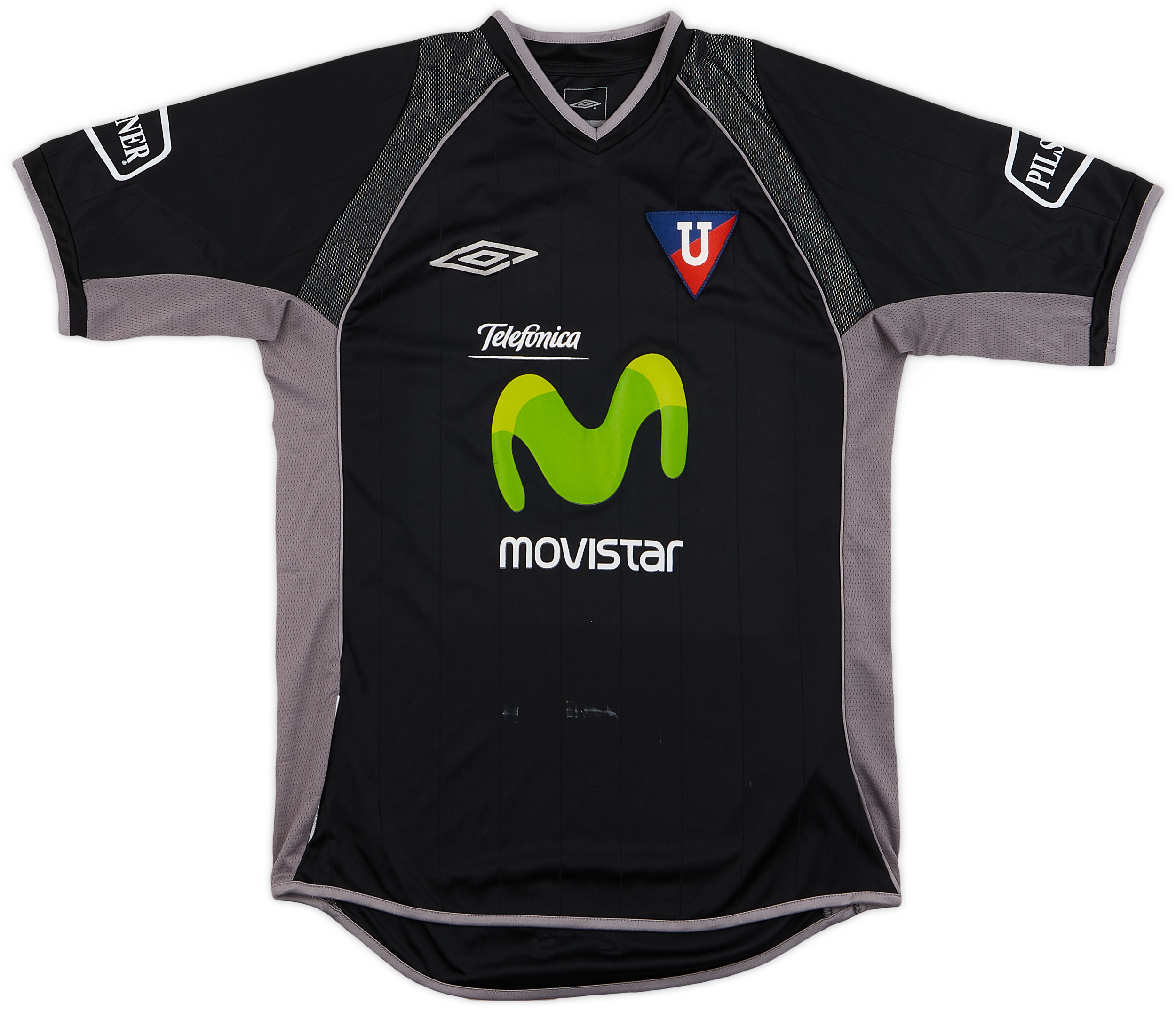LDU Quito
Introduction LDU Quito, officially known as Liga Deportiva Universitaria de Quito, is one of the most storied football clubs in Ecuador and South America. Founded on January 11, 1930, the club has risen from its humble origins to become a powerhouse in Ecuadorian football, earning a reputation for both competitive spirit and a rich history. […]
2003-04 LDU Quito Third Shirt - 8/10 - (XL)
106.99£ - ca: €126
2019 LDU Quito Home Shirt Valencia #25 - 9/10 - (XL)
106.99£ - ca: €126
2005 LDU Quito Third Shirt - 6/10 - (S)
106.99£ - ca: €126
2005 LDU Quito Home Shirt - 8/10 - (M)
106.99£ - ca: €126
2014 LDU Quito Match Worn Home Shirt #24
94.99£ - ca: €112
2017 LDU Quito Home Shirt - 9/10 - (XL)
70.99£ - ca: €84
2003 LDU Quito Home Shirt - 5/10 - (L)
58.99£ - ca: €70
2005 LDU Quito Fan Shirt - 4/10 - (L)
23.99£ - ca: €28
Introduction
LDU Quito, officially known as Liga Deportiva Universitaria de Quito, is one of the most storied football clubs in Ecuador and South America. Founded on January 11, 1930, the club has risen from its humble origins to become a powerhouse in Ecuadorian football, earning a reputation for both competitive spirit and a rich history. Based in the vibrant capital city of Quito, LDU has become synonymous with local pride, sporting excellence, and a resilient fan culture.
Club History
The club was established by students and alumni of the Central University of Ecuador, aiming initially to promote physical education through the sport of football. LDU Quito quickly became a significant presence in the Ecuadorian football scene, participating in the first-ever national championship in 1957. Over the years, the club has built a legacy marked by transformative leadership and strategic growth. In the 1980s, under the presidency of Eduardo Maruri, LDU initiated a successful era that would redefine its status in regional football.
Key historical moments for LDU include their establishment of professional standards and organization that set them apart from other clubs in Ecuador. Their motto, “La Academia” (The Academy), reflects not just a commitment to success but to community and education. The club’s directives have always intertwined sporting achievement with the broader social responsibility of nurturing talent within the community.
Achievements
LDU Quito boasts an impressive collection of silverware, both domestically and internationally. They have won the Ecuadorian Serie A championship a remarkable 11 times, with their titles spread across various decades, showcasing both historical dominance and a consistent level of competitiveness. Notably, their domestic titles include championships from 1960, when they first clinched the national title, to their most recent crown in 2010.
On the international stage, LDU Quito achieved a monumental feat by winning the Copa Libertadores in 2008, becoming the first Ecuadorian team to do so. This victory was particularly significant, as they triumphed against Fluminense in a dramatic penalty shootout in the finals. They didn’t stop there; LDU Quito also secured the Copa Sudamericana in 2009 and the Recopa Sudamericana in 2009 and 2010, solidifying their status as one of the most successful clubs in South American football history. Their achievements in international competitions have placed them prominently on the global football map.
Significant Players and Matches
Throughout its history, LDU Quito has been home to several legendary players who contributed vastly to the club’s success. One of the most revered figures is the Argentine forward Hernán Barcos, whose time at the club saw him become one of the top scorers in the Serie A. Another standout player, Patricio Urrizola, was integral to the club’s rise in the late 90s and early 2000s, while goalkeeper José Francisco Cevallos stood out as a key figure during their historic Copa Libertadores run.
Landmark matches often define clubs, and for LDU Quito, the 2008 Copa Libertadores final against Fluminense is one that resonates deeply with fans. The match, played at the Maracanã Stadium, was an exhilarating encounter that ended in a 3-3 draw after extra time, leading to penalties. LDU’s successful shootout made football history, underscoring their grit and determination.
Cultural Impact
LDU Quito holds a special place in Ecuadorian culture and identity. The club is more than just a football team; it represents the aspirations and pride of many Quitoans and Ecuadorians. The club’s supporters, known as “La Barra de los Puros Criollos,” are renowned for their passionate backing, creating a vibrant atmosphere at the Estadio Rodrigo Paz Delgado during home games.
Moreover, LDU Quito actively engages with local communities, supporting various social initiatives that reflect its commitment to empowering youth through sport. These efforts have helped foster a loyal fanbase that extends beyond just football, as supporters appreciate the club’s contributions to the social fabric of Quito.
Conclusion
LDU Quito is not just a football club; it is a symbol of regional pride and resilience in the face of adversity. With a rich history, an impressive trophy cabinet, and a commitment to pushing the boundaries of Ecuadorian football, LDU continues to shine on both domestic and international stages. The club’s journey is a testament to the power of sport as a unifying force, making it a cherished institution in the world of football and among Ecuadorian hearts. As LDU Quito forges ahead into the future, its legacy will undoubtedly inspire generations to come, reinforcing its place in the annals of football history.







